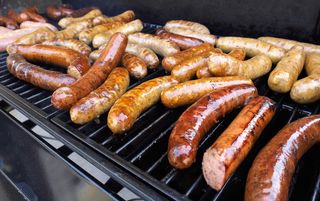Grilling Danger: Wire Brushes Cause Injuries, Doctors Warn

Before you start grilling this summer, you should probably take a close look at your grill brush; doctors are warning about rare but serious injuries tied to the cleaning tools.
In a new study, researchers attempted to estimate how many Americans are injured by ingesting wire bristles from grill brushes. These injuries can happen when bristles from the cleaning tools come lose, stick to the grill and then end up in food.
The study found that between 2002 and 2014, nearly 1,700 Americans visited the emergency room for injuries related to ingesting grill-brush bristles. Among these cases, injuries to the mouth, throat and tonsils were the most common, but people also suffered injuries to the stomach or intestines. Most of the injuries occurred in June, July and August.
"Injury from wire-bristle grill brush is uncommon but prevalent during certain seasons," the researchers, from the University of Missouri, wrote in the April issue of the journal Otolaryngology-Head and Neck Surgery. "Awareness among consumers and product manufacturers is necessary to promote safety," the authors said. [Grill Science: 5 Sizzling Tips]
Most patients were treated in the emergency room, but some required surgery, the study said.
The researchers advised consumers to be cautious when using wire-bristle brushes, to check the brushes before each use and to throw away brushes that have loose bristles. People should also check grilling grates for bristles before cooking, the researchers said.
ER physicians; radiologists; and ear, nose and throat doctors should also be aware of these types of injuries, so that these professionals can promptly diagnose and treat the injuries, the researchers said.
Sign up for the Live Science daily newsletter now
Get the world’s most fascinating discoveries delivered straight to your inbox.
Follow Rachael Rettner @RachaelRettner. FollowLive Science @livescience, Facebook& Google+. Original article on Live Science.

Rachael is a Live Science contributor, and was a former channel editor and senior writer for Live Science between 2010 and 2022. She has a master's degree in journalism from New York University's Science, Health and Environmental Reporting Program. She also holds a B.S. in molecular biology and an M.S. in biology from the University of California, San Diego. Her work has appeared in Scienceline, The Washington Post and Scientific American.
Most Popular



